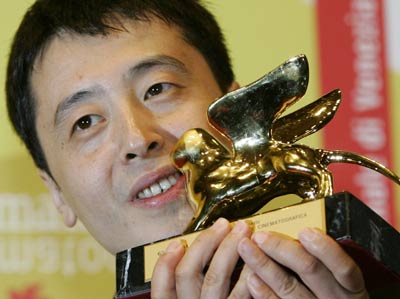Director Jia casts light on working-class struggles
(AP)Updated: 2006-11-22 15:59
Chinese director Jia Zhangke's movies don't feature flashy kung fu moves, Peking Opera or lavish Chinese imperial palaces.
 Director Jia Zhang-ke poses with the Golden Lion at the Cinema Palace in Venice September 9, 2006. Zhangke's movie 'Still Life' won Venice Film Festival's Golden Lion top prize on Saturday. [Reuters]  |
Over his 12-year career, Jia has shunned the Chinese cultural motifs most familiar to the West, instead making films that portray the struggles of China's working class in the midst of rapid economic and social change.
In "Unknown Pleasures" (2002), he finds absurdity in the ignorance of China's unemployed youth. One character can't figure out how to turn on the water in a hotel room.
In "The World" (2004), Jia uses a park featuring miniatures of the world's major tourist attractions as a metaphor for the illusion of prosperity in China.
His "Still Life," set against the controversial Three Gorges dam project, won this year's Golden Lion, the top prize at the Venice Film Festival. U.S. director Martin Scorsese says he was "mesmerized" by Jia's debut feature film "Xiao Wu" (1997).
But from 1999 to 2004, China's censors sought to bar Jia from making films. He was able to ignore the ban and now is not only acclaimed abroad, but is gaining an audience at home. "The World" was distributed in China, and "Still Life" is scheduled to be shown there.
In Hong Kong recently to promote "Still Life," the 36-year-old Jia was unwavering about his vision. "Art is about truth, benevolence and beauty," he told The Associated Press.
He feels it is only natural to want to make movies about people adversely affected by sweeping economic and social change, and he speaks confidently of his mission to draw attention to the unskilled workers who haven't enjoyed the fruits of China's shift to a market-oriented economy.
"The country and society have changed so rapidly, sacrificing the interests of so many ordinary people. Naturally, I will feel close to them and make movies about them," he says.
Jia is concerned about the situation of state workers who have lost their jobs. "They had a steady income. They worked at state-owned factories. They have this self-esteem derived from this idea of state factories being based on workers ¡ª no matter what, workers are a main pillar of society, a leadership class. That promise has changed," he says.
Clearly, Jia sees himself as an artist with a social conscience, with his empathy for workers stemming from his background as the son of a teacher and a saleswoman in the small city of Fenyang in northern Shanxi province.
Jia, who studied art in Shanxi before moving to the Beijing Film Academy, believes movies can promote social change because "they can turn into a form a public discourse."
He promotes this view by using a slow, contemplative style of filmmaking, with extended still shots. The intention is to present an attitude of "calmly observing things from a distance, respecting events and not disrupting their evolution," he said at a recent conference in Hong Kong.
China's younger generation of directors prefers to present a more individual perspective of society and reality, Jia says, in contrast to older directors Zhang Yimou and Chen Kaige, whose shift to commercial cinema is a product of China's current focus on business.
But some may question Jia's own motivations. In a deal with Sinolink Properties Ltd, the developer of an upscale apartment complex in Shenzhen, the company has sponsored the distribution of "Still Life" in return for Jia offering advice on movies, art and music to Sinolink's wealthy tenants.
Jia says of the deal, "That's the way society is. Some people live in $6 million (?.7 million) houses, and some people don't have a place to live."
The important thing is to maintain an "awareness of different realities," he said.
"You can't expect artists who make movies about the working class to live in grass huts. That's very fake," Jia says.
Jia's next project, "Tattoo Age," will be a drama about young gangsters set against the Cultural Revolution.
Taiwanese pop star Jay Chou has been approached about a role, paving the way for Jia to cast a big star for the first time.
The film is scheduled to start shooting early next
year.
| ||
|
||
|
||
|
|